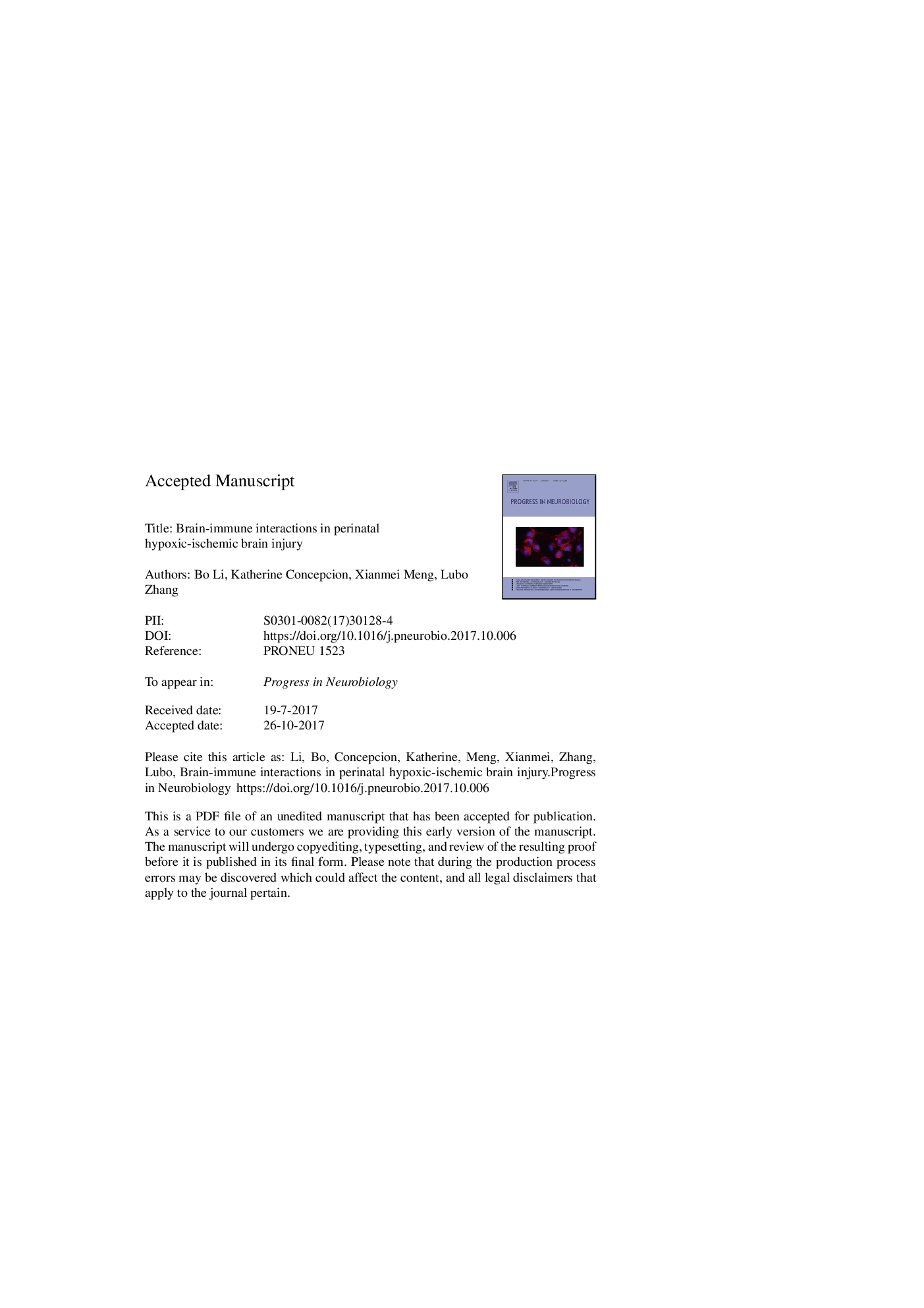| کد مقاله | کد نشریه | سال انتشار | مقاله انگلیسی | نسخه تمام متن |
|---|---|---|---|---|
| 8842204 | 1615356 | 2017 | 74 صفحه PDF | دانلود رایگان |
عنوان انگلیسی مقاله ISI
Brain-immune interactions in perinatal hypoxic-ischemic brain injury
ترجمه فارسی عنوان
تعاملات ایمنی مغز در آسیب مغزی هیپوسیک-ایسکمیک پری ناتال
دانلود مقاله + سفارش ترجمه
دانلود مقاله ISI انگلیسی
رایگان برای ایرانیان
کلمات کلیدی
PD-L1ICAM-1TCrEAEDCsTLRHMGB1APCsPNDMHC-IISOCS1miRNAsHIETNF-R1High-mobility group protein B1DAMPsMmpsRHIL-1raSTAT3ROS - ROSAdenosine Triphosphate - آدنوزین تری فسفاتATP - آدنوزین تری فسفات یا ATPNeonatal brain injury - آسیب مغزی نوزادانAntigen presenting cells - آنتیژن ارائه سلولexperimental autoimmune encephalomyelitis - آنسفالومیلیت خودایمنی تجربیHypoxic-ischemic encephalopathy - آنسفالوپاتی ناشی از هیپوکسی-ایسکمیکNeuroinflammation - التهاب عصبیToll-like receptor - تیالآرCord blood - خون بند نافImmunomodulatory therapy - درمان ایمن سازیCNS - دستگاه عصبی مرکزیpostnatal day - روز پس از زایمانmicroRNAs - ریز آرانایblood brain barrier - سد خونی مغزیBBB - سد خونی مغزیDendritic cells - سلول های دندریتیکcentral nervous system - سیستم عصبی مرکزیgranulocyte colony-stimulating factor - فاکتور تحریک کننده کلنی گرانولوسیتG-CSF - فاکتور محرک کُلونی گرانولوسیتPeriventricular leukomalacia - لکو مالاتیا پریوژنیکالCSF - مایع مغزی نخاعیCerebrospinal fluid - مایع مغزی نخاعیsignal transducer and activator of transcription 3 - مبدل سیگنال و فعال کننده رونویسی 3Matrix metalloproteinases - متالوپروتئیناز ماتریکسprogrammed death-ligand 1 - مرگ برنامهریزی لیگاند 1bone marrow - مغز استخوانPVL - مقاله از استخراج اجباریIntercellular adhesion molecule 1 - مولکول چسبندگی بین سلولی 1knock-out - ناک اوتNitric oxide - نیتریک اکسیدTherapeutic hypothermia - هیپوترمی درمانیhypoxic-ischemic - هیپوکسیک-ایسکمیکInflammatory mediators - واسطه های التهابیInnate immune response - پاسخ ایمنی ذاتیAdaptive immune response - پاسخ ایمنی متناسبSHIP-1 - کشتی 1Reactive oxygen species - گونههای فعال اکسیژنT cell receptor - گیرنده سلول T
ترجمه چکیده
ایسکمی هیپوکسی پریناتال عامل اصلی آسیب مغزی حاد نوزاد است که منجر به مرگ و میر بالا و نقص های مغزی ناشی از طول عمر مانند نقص های حرکتی، اجتماعی، توجه، شناختی و عملکردی می شود. یکی از شواهد حاکی از آن است که پاسخ ایمنی به ایسکمی هیپوکسی حاد مغزی یکی از مهمترین عوامل پاتوفیزیولوژی آسیب مغزی نوزادان است. ایسکمی هیپوکسیا یک آبشار التهابی داخل عروقی را تحریک می کند که بیشتر با فعال سازی سلول های ایمنی ساکن و انفوزیون مغزی پاسخ سلول های سیستم ایمنی به ضایعات سلولی در پارنچیم مغز تقویت می شود. این التهاب عصبی طولانی مدت و یا نامناسب منجر به آسیب بافتی ثانویه مغز می شود. با این حال، اثرات درازمدت فعال سازی ایمنی، به ویژه واکنش ایمن سازگار، در مغز اسیکسیک اسید هنوز هم مشخص نیست. تمرکز این بررسی خلاصه ای از پیشرفت های اخیر در درک از عود ناشی از عروق پس از هیپوکسیک مزمن ناشی از پاسخ های ایمنی ذاتی و انعطاف پذیر است و به بحث در مورد چگونگی این سازوکارها آسیب پذیری مغز به آسیب را مداخله. درک بیشتر در مورد تعاملات متقابل بین مغز اگزوسیک-ایسکمیک و سیستم ایمنی بدن، راه های جدیدی را برای درمان بالقوه ایمن سازی در درمان آسیب مغز نوزاد ایجاد می کند.
موضوعات مرتبط
علوم زیستی و بیوفناوری
علم عصب شناسی
علوم اعصاب (عمومی)
چکیده انگلیسی
Perinatal hypoxia-ischemia remains the primary cause of acute neonatal brain injury, leading to a high mortality rate and long-term neurological deficits, such as behavioral, social, attentional, cognitive and functional motor deficits. An ever-increasing body of evidence shows that the immune response to acute cerebral hypoxia-ischemia is a major contributor to the pathophysiology of neonatal brain injury. Hypoxia-ischemia provokes an intravascular inflammatory cascade that is further augmented by the activation of resident immune cells and the cerebral infiltration of peripheral immune cells response to cellular damages in the brain parenchyma. This prolonged and/or inappropriate neuroinflammation leads to secondary brain tissue injury. Yet, the long-term effects of immune activation, especially the adaptive immune response, on the hypoxic-ischemic brain still remain unclear. The focus of this review is to summarize recent advances in the understanding of post-hypoxic-ischemic neuroinflammation triggered by the innate and adaptive immune responses and to discuss how these mechanisms modulate the brain vulnerability to injury. A greater understanding of the reciprocal interactions between the hypoxic-ischemic brain and the immune system will open new avenues for potential immunomodulatory therapy in the treatment of neonatal brain injury.
ناشر
Database: Elsevier - ScienceDirect (ساینس دایرکت)
Journal: Progress in Neurobiology - Volume 159, December 2017, Pages 50-68
Journal: Progress in Neurobiology - Volume 159, December 2017, Pages 50-68
نویسندگان
Bo Li, Katherine Concepcion, Xianmei Meng, Lubo Zhang,
